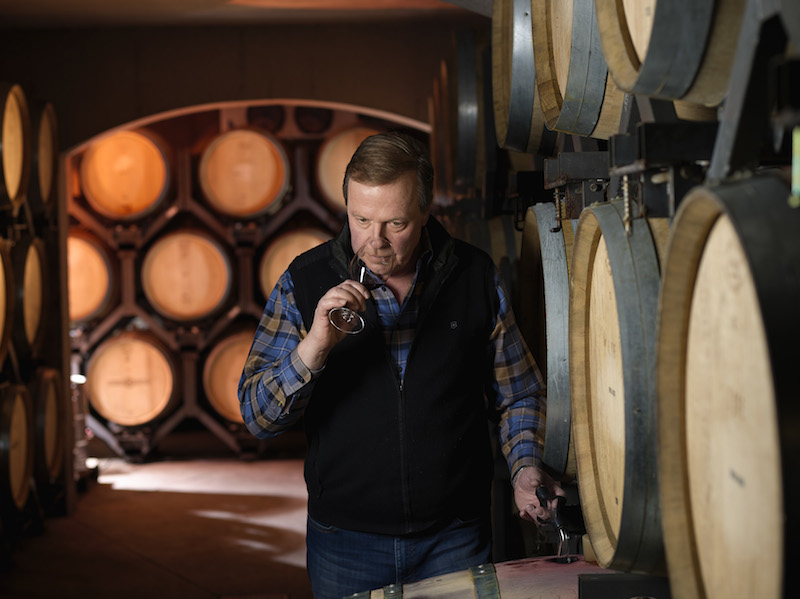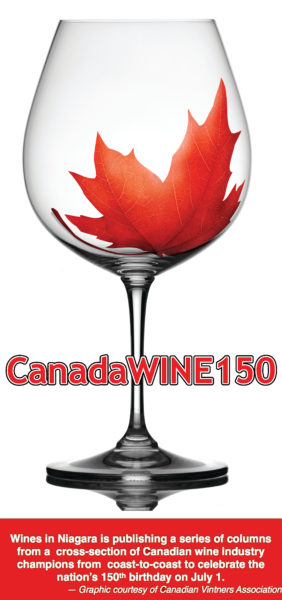
By Harald Thiel
When I was approached by Rick to share a few thoughts regarding the Canadian wine industry and Canada’s 150th birthday many topics came to mind.
I could have easily expounded about the amazing quality of wine being made in many parts of Canada, or I could have written about the incredible accolades and recognition that Canadian wines and wineries are now garnering throughout the world.
 Instead I have chosen to share with you the frustration that many Canadian vintners (particularly smaller artisanal producers) feel about the lack of inter-provincial direct access to our clients.
Instead I have chosen to share with you the frustration that many Canadian vintners (particularly smaller artisanal producers) feel about the lack of inter-provincial direct access to our clients.
As anyone who is even remotely associated with the wine industry knows, the inter-provincial transportation of alcohol (wine included) was regulated by the 1928 (Prohibition era) “Importation of Intoxicating Liquor Act.” This federal statute made it a criminal offence to transport alcoholic beverages between provinces and had as its foundation, or “raison d’être,” in the fact that certain provinces embraced Prohibition and others did not.
Post Prohibition, the provincial monopolies who sold alcohol encouraged the federal government to enact this federal law to protect their monopolies and to avoid inter-provincial competition.
The 2014 federal budget provided amendments to this act with the express intention of permitting Canadians to have free access to their favourite Canadian wine no matter where it was grown within Canada. As with most regulations the “devil is in the detail” as the provinces were required to pass enabling legislation to give effect to these federal amendments.
To date, only certain provinces have “opened their borders” completely, while others, such as Ontario and Quebec, have only passed token amendments. For example, the Ontario amendment permits an individual to buy one case of wine outside Ontario but he/she must transport the wine on their person to return to Ontario legally (sic). Have you ever tried to fly with a case of wine recently? Good luck!
This amendment, as well as the Quebec amendments, was done expressly to stymie online or e-commerce winery purchases by individual consumers and to protect tax revenues for the province where the buyer resides. In the distorted world of the provincial monopolies, when a winery sells a bottle or case of wine to a consumer in that monopolies’ province the winery, even though it does not reside in that province, should remit the taxes and markup as if that monopoly had completed the sale.
Not only are the monopolies trying to impose extra territorial jurisdiction, in my humble opinion, restricting a winery’s ability to sell wine extra-provincially is in direct contravention of Section 121 of the Canadian Constitution which states:
-
All Articles of the Growth, Produce, or Manufacture of any one of the Provinces shall, from and after the Union, be admitted free into each of the other Provinces.
This restrictive trade policy is flawed in that it is insular in its application and very short sighted in terms of the long term overall benefit to Canada and Canadians. If all Canadian wineries could sell wine directly to any individual consumer the following benefits would accrue to all Canadians:
- Overall Canadian tax revenue would grow because of industry growth and associated employment in oeno-tourism
- Opening markets would permit Canadians to develop a more in-depth and wide spread Canadian wine culture and nationalistic pride in our wines.
- It would lead Canadians to develop a better understanding and brand loyalty to Canadian wines by enhancing oeno-tourism and easier access to their favourite Canadian wines
- Would assist with the growth of the Canadian wine industry and thereby positively impact our balance of trade because of less dependence on imports.
- By only applying to Canadian products we would be encouraging the growth of the Canadian produced alcoholic beverage industry
The Supreme Court of Canada has been seized of this issue and any future ruling could be the linchpin for the provincal alcohol monopolies and open the doors to real competition in this sector of the economy for domestic producers. This is why CALJ (Canadian Association of Liquor Jurisdictions) is banding together to join the appeal at the Supreme Court of Canada of the recent New Brunswick decisions that held in favour of free trade for domestic producers.

On the eve of Canada’s 150th birthday, it is my desire for all Canadians and for all Canadian vintners and brewers that our governments permit the free inter-provincial trade of domestically produced alcoholic beverages within all the provinces and territories of our great country.
When I tell my some of my French, Austrian or German colleagues that we cannot ship our product to all provinces of our own country due to inter-provincial trade barriers they just smile and rub their hands with mercantile glee. As a mature country that has the ability to be so progressive in regards to same sex marriage, cannabis, the environment and a host of other issues why are we still in the dark ages when it comes to alcoholic beverage retailing?
Imagine that we may soon be able to legally ship cannabis coast to coast but not a case of Locust Lane Rosé. It is time for change in our great country. Santé, and let’s not forget we are privileged to live in this great country.
Happy 150th Birthday Canada!
Note: For past columns on this #CanadaWINE150 feature, go here.
Harald Thiel
Vigneron/Proprietor
Hidden Bench Estate Winery
Since he was a young man, Harald has had the dream of owning a premium quality artisanal winery. In 2003, after a successful business career in the audiovisual industry, he and his family founded Hidden Bench Estate Winery with the goal of producing premium quality estate grown wines, which Canadians could serve with pride side by side with the best wines in the world. As a hands-on fully engaged owner he is actively involved in the day-to-day operations of the winery from vineyard to bottle and provides the winery its strategic direction and focus. A passionate foodie and wine consumer, he is also one of the founders of the Upper Canada Cheese Company and the International Cool Climate Chardonnay Festival. A strong believer in giving back, he sits on a number of not-for-profit boards, is the current Chair of the Metro Toronto Convention Centre and has spearheaded a number of local environmental causes to protect the Beamsville Bench area. In his spare time Harald loves to read, cook, fly fish and ski.






Comment here